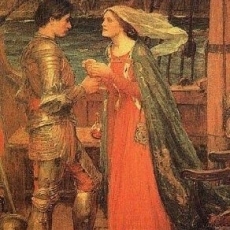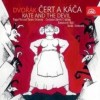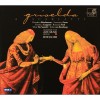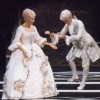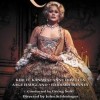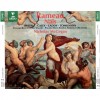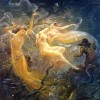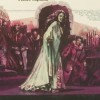Libretto
Tristan und Isolde (Tristan and Isolde, or Tristan and Isolda) is an opera, or music drama, in three acts by Richard Wagner to a German libretto by the composer, based largely on the romance by Gottfried von Straßburg. It was composed between 1857 and 1859 and premiered in Munich on 10 June 1865 with Hans von Bülow conducting.
Wagner's composition of Tristan und Isolde was inspired by his affair with Mathilde Wesendonck and the philosophy of Arthur Schopenhauer. Widely acknowledged as one of the peaks of the operatic repertory, Tristan was notable for Wagner's advanced use of chromaticism, tonality, orchestral colour and harmonic suspension.
The opera was profoundly influential amongst Western classical composers and provided inspiration to composers such as Gustav Mahler, Richard Strauss, Karol Szymanowski, Alban Berg and Arnold Schoenberg. Many see Tristan as the beginning of the move away from conventional harmony and tonality and consider that it lays the groundwork for the direction of classical musical in the 20th century.
Synopsis
Act 1
Isolde, promised to King Marke in marriage, and her handmaid, Brangäne, are quartered aboard Tristan’s ship being transported to the king's lands in Cornwall. The opera opens with the voice of a young sailor singing of a “wild Irish maid,” which Isolde construes to be a mocking reference to herself. In a furious outburst, she wishes the seas to rise up and sink the ship, killing all on board. In what is termed the "narrative and curse" her scorn and rage are directed particularly at Tristan, the knight responsible for taking her to Marke, and Isolde sends Brangäne to command Tristan to appear before her. Tristan, however, refuses Brangäne's request, claiming that his place is at the helm. His henchman, Kurwenal, answers more brusquely, saying that Isolde is in no position to command Tristan and reminds Brangäne that Isolde’s previous fiancé, Morold, was killed by Tristan.
Brangäne returns to Isolde to relate these events, and Isolde sadly tells her of how, following the death of Morold, a stranger called Tantris was brought to her. Tantris was found mortally wounded in a boat, and Isolde used her healing powers to restore him to health. She discovered during Tantris' recovery, however, that he was actually Tristan, the murderer of her fiancé. Isolde attempted to kill the man with his own sword as he lay helpless before her but, Tristan had looked not at the sword that would kill him, but into her eyes. His action pierced her heart and she was unable to slay him. Tristan was allowed to leave, but later returned with the intention of marrying Isolde to his uncle, King Marke. Isolde, furious at Tristan’s betrayal, insists that he drink atonement to her, and from her medicine-chest produces a vial to make the drink. Brangäne is shocked to see that it is a lethal poison.
Kurwenal appears in the women’s quarters and announces that Tristan has agreed to see Isolde after all. When Tristan arrives, Isolde tells him that she now knows that he was Tantris, and that he owes her his life. Tristan agrees to drink the potion, now prepared by Brangäne, even though he knows it may kill him. As he drinks, Isolde tears the remainder of the potion from him and drinks it herself. At this moment, each believing that their lives are about to end, the two declare their love for each other. Kurwenal, who announces the imminent arrival on board of King Marke, interrupts their rapture. Isolde asks Brangäne which potion she prepared and Brangäne replies, as the sailors hail the arrival of King Marke, that it was not a poisonous drink, but rather a love-potion.
Act 2
King Marke leads a hunting party out into the night, leaving the castle empty save for Isolde and Brangäne, who stand beside a burning brazier. Isolde, listening to the hunting horns, believes several times that the hunting party is far enough away to warrant the extinguishing of the brazier -- the prearranged signal for Tristan to join her. Brangäne warns Isolde that Melot, one of King Marke’s knights, has seen the amorous looks exchanged between Tristan and Isolde and suspects their passion. Isolde, however, believes Melot to be Tristan’s most loyal friend, and, in a frenzy of desire, extinguishes the flames. Brangäne retires to the ramparts to keep watch as Tristan arrives.
The lovers, at last alone and freed from the constraints of courtly life, declare their passion for each other. Tristan decries the realm of daylight which is false, unreal, and keeps them apart. It is only in night, he claims, that they can truly be together and only in the long night of death can they be eternally united. During their long tryst, Brangäne calls a warning several times that the night is ending, but her cries fall upon deaf ears. The day breaks in on the lovers as Melot leads King Marke and his men to find Tristan and Isolde in each other's arms. Marke is heart-broken, not only because of his adopted son Tristan's betrayal but also because Marke, too, has come to love Isolde. The Act II love duet is regarded by some as the most rapturous in all of western music.
Tristan turns to Isolde, who agrees to follow him again into the realm of night. Melot and Tristan fight, but, at the crucial moment, Tristan throws his sword aside and Melot mortally wounds him.
Act 3
Kurwenal has brought Tristan home to his castle at Kareol in Brittany. A shepherd pipes a mournful tune and asks if Tristan is awake. Kurwenal replies that only Isolde’s arrival can save Tristan, and the shepherd offers to keep watch and claims that he will pipe a joyful tune to mark the arrival of any ship (written for the tarogato but usually played on the cor anglais). Tristan awakes and mourns his fate -- to be, once again, in the false realm of daylight, once more driven by unceasing unquenchable yearning. Tristan's mourning ends when Kurwenal tells him that Isolde is on her way. Tristan, overjoyed, asks if her ship is in sight, but only a sorrowful tune from the shepherd’s pipe is heard.
Tristan relapses and recalls that the shepherd’s mournful tune is the same that was played at the deaths of his father and mother. He rails once again against his desires and against the fateful love-potion until, exhausted, he collapses in delirium. After his collapse, the shepherd is heard piping the arrival of Isolde’s ship, and, as Kurwenal rushes to meet her, Tristan tears the bandages from his wounds in his excitement. As Isolde arrives at his side, Tristan dies with her name on his lips.
Isolde collapses beside her deceased lover just as the appearance of another ship is announced. Kurwenal spies Melot, Marke and Brangäne arriving and, in an attempt to avenge Tristan, furiously attacks Melot. Both Melot and Kurwenal, however, are killed in the fight. Marke and Brangäne finally reach Tristan and Isolde. Marke, grieving over the body of his “truest friend,” explains that he learned of the love-potion from Brangäne and has come not to part the lovers, but to unite them. Isolde appears to wake at this, but instead, in a final aria describing her vision of Tristan risen again (the “Liebestod”, "love death"), dies of grief.





